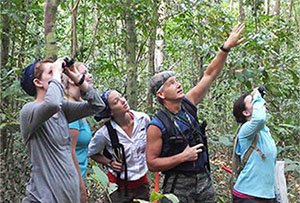Faculty
Faculty Interdisciplinary Research Pilot Awards
The Psychology Department held its first funding competition for Faculty Interdisciplinary Research Pilot Awards (FIRPA) last spring. These projects aimed to generate exciting research questions that connect different sub-areas of the department. The first round of recipients represented a variety of departmental research areas, including child and adult clinical psychology, behavioral neuroscience, developmental psychology, and social psychology, and asked questions at the nexus of trauma, memory, autism, culture, and school violence. The three winning projects are featured below.
 |
.jpg) |
| Wendy Stone | Jessica Sommerville |
Drs. Wendy Stone (Child Clinical) and Jessica Somerville (Developmental) received funding for The Social Attention Study, which is exploring whether differences in social attention and responding are evident in the first year of life among infants who are at elevated risk for a later Autism Spectrum Disorder (ASD) diagnosis. Mechanisms of social development are being explored, by asking whether parental characteristics of empathy, prosociality, and subclinical features of ASD are related to early individual differences in social attention and responding. The longitudinal and cross-sectional samples comprise infants at low-risk for ASD and those at high-risk. Infants at high-risk are those who have an older sibling with an ASD diagnosis, as they have a one in five chance of receiving a later diagnosis, as compared to a prevalence rate of one in 68 in the general population. The project will provide greater insight into early social development by determining how infants’ tendencies to respond to various social and emotional stimuli might be related to each other, and what patterns of interrelations emerge throughout the first year of life.
 |
.jpg) |
| Lori Zoellner | Jeansok Kim |
Professors Lori Zoellner (Adult Clinical), Jeansok Kim (Behavioral Neuroscience), and Libby Marks (doctoral student Adult Clinical), received funding for a project examining how to intervene with the fear-learning process to help reduce intrusive re-experiencing (i.e., cued memories, nightmares, out-of-the-blue intrusions), a source of vulnerability for those with depression and posttraumatic stress disorder, PTSD). They used a distressing film paradigm (fear acquisition; clip from ‘The Last King of Scotland') to induce intrusive memories as an analogue to a real-life traumatic event and later re-exposed participants to a brief neutral "cue" image of the film within what is known as the "reconsolidation window." This window is thought to make the memory more vulnerable to modification during a subsequent period of repeated presentation of the film (fear extinction). Markers of stress and synaptic plasticity were also collected, including salivary cortisol, alpha-amylase, and heart rate.
Those who received the neutral cue within the reconsolidation window reported fewer intrusions 48 hours later than those who received a more distressing, negative cue, arguing that the valence of the cue may be important for facilitating later intrusion reduction. However, those receiving the neutral cue did not differ in later intrusions from those who received an out of the window cue or a scrambled cue. This suggests negative within-window cues, in particular, may inhibit fear reduction and maintain intrusive symptoms. Next steps include examining individual trajectories of stress responding during extinction, including analysis of heart rate data, as a possible mediator of intrusions. Given the exciting potential application of reconsolidation to enhance therapies for anxiety and traumatic stress disorders, this work of honing boundary conditions of retrieval cues specifically and reconsolidation more broadly are critical.
 |
 |
 |
| Stephanie Fryberg | Katie McLaughlin | Kristina Olson |
Drs. Stephanie Fryberg (Social Psychology), Katie McLaughlin (Child Clinical), and Kristina Olson (Developmental Psychology) began a project examining how people respond to trauma and how these responses differ depending on a person’s cultural background and closeness to the traumatic event. They investigated coping behavior and socio-emotional outcomes following a school shooting in a local school district that serves both a local tribal community and a neighboring city. They found that the impact of the shooting was felt widely across the school district, as opposed to being limited to the school in which the shooting occurred. In particular, schools with large Native populations (who therefore have tribal ties with some of the victims of the shooting and the shooter), reported negative student behaviors (such as withdrawal, fear, outbursts, aggression, etc.), at rates indistinguishable from the location of the school shooting. Individuals within the former schools reported significant adjustments to their interactions with students, parents, colleagues, and family members in order to provide support to those around them and garner support for themselves. In addition to behavioral indicators of maladjustment, people also reported heightened negative emotions, feelings of avoidance of thinking about the event, and catastrophizing. Although the data suggest that individuals are improving as time has moved from the event, there is also evidence of long-term negative effects on community relations. In particular, immediately following the shooting, people reported that the tribal community and the neighboring city were brought closer together by the event; however, this immediate unity is breaking down, and people are reporting a growing divide between the two communities.
Psychology Department Faculty Awards
May 2016
 |
| Marsha Linehan |
Marsha M. Linehan, PhD, ABPP was Career/Lifetime Achievement Award from the Association for Behavioral & Cognitive Therapies (ABCT). This is the highest award given by ABCT and honors those who have made significant contributions over a number of years to cognitive and/or behavior therapy.
 |
| Susan Joslyn |
Susan Joslyn, PhD, was awarded Improving Public Response to Weather Warnings grant from the National Science Foundation. This project is designed to explore three psychological issues associated with distrust that may be related to warning forecast communication.
April 2016
 |
| Stephanie Fryberg |
Stephanie Fryberg, PhD, was awarded a research grant from the Raikes Foundation, "Moving Beyond Changing Mindsets: Creating a Culture of Growth in Schools."
 |
| Lori Zoellner |
Lori Zoellner, PhD, received funding from the Seattle Foundation and from the Catherine Holmes Wilkins Foundation (in January 2016) for her work on Trauma Healing.
 |
| Kristina Olson |
Kristina Olson, PhD, was recognized by APS with the 2016 Janet Taylor Spence Award for Transformational Early Career Contributions.
 |
| Katie McLaughlin |
Katie McLaughlin, PhD, received funding from the Massachusetts General Hospital/National Institutes of Health for her work on mechanisms underlying racial/ethnic disparities in mental disorders.
February 2016
 |
| Chantel Prat |
Chantel Prat, PhD, received funding from the Royalty Research Fund for her work titled Using Brain-Targeted Training to Improve Reading Comprehension: A Neuro-Feedback Approach.
January 2016
Kristina Olson, PhD, received a $200,000 grant from the Arcus Foundation for her work titled Trans Youth Project.
Kate McLaughlin, PhD, received the 2016 APA Distinguished Scientific Award for Early Career Contribution to Psychology, as well as a nearly three million dollar National Institutes of Health RO1 award for her research titled "Deprivation and Threat: Dimensions of Early Experience and Neural Development.” This is the second active RO1 award in Kate’s lab.
 |
| Jane Simoni |
Jane Simoni, PhD, received a Global Innovation Fund award from the Office of Global Affairs. The award was in support of a China-UW Nursing and Psychology Partnership.
 |
| Yuichi Shoda |
Yuichi Shoda, PhD was one of the 2015 Golden Goose Awardees for his work on the famous Marshmallow Test.
December 2015
Jane Simoni, PhD, was awarded grant funding from Seattle Children's.
November 2015
Katie McLaughlin, PhD, was awarded the Jacobs Foundation Early Career Research Fellowship 2016-2018.
 |
| Tony Greenwald |
Anthony Greenwald, PhD, is one of two researchers chosen to receive the most prestigious award of the Society for the Psychological Study of Social Issues. Greenwald and Mahzarin Banaji, a social psychologist at Harvard University, were named joint recipients of the 2016 Kurt Lewin Award.
Randall C Kyes, PhD: Celebrating 100
 |
| Randy Kyes and students in 2015 |
The Department of Psychology is not alone in celebrating 100. This coming July, Randy Kyes will conduct his 100th field course (“Field Course in Conservation Biology & Global Health”). This represents a significant milestone covering 25 years of annual field courses conducted in eight countries for in-country students and professionals, as well as for UW/U.S. students via his study abroad in Indonesia.
All of Prof. Kyes' research, teaching and service activities have a strong international focus. Since coming to the University of Washington, he has been responsible for helping to establish collaborative programs in a number of countries, including Indonesia, Nepal, China, Thailand, Bangladesh, Democratic Republic of Congo, Mexico, and India, with developing programs in Laos, Vietnam, Cambodia, and Brazil. These partnerships involve joint research, annual field training programs for local university students and professionals, and community outreach education programs for school children, K-12.
Although splitting his time among the program countries, Prof. Kyes has worked in Indonesia the longest (over 25 years) collaborating with Bogor Agricultural University and their Primate Research Center as well as a number of other institutions. In 1995, Prof. Kyes established the International Field Study Program-Indonesia at the Univ. of Washington. This annual, month-long study abroad program in Indonesia provides field-based educational and research opportunities for undergraduate and graduate students from UW. The program is conducted on Tinijil Island in conjunction with the field course for Indonesian students thus allowing the students of both countries the opportunity for cultural exchange, language development, and future partnerships. To date, over 85 students from UW and other U.S. institutions have participated in this study abroad program. In 2012, this program received a grant as part of the US-Indonesia Partnership Program (USIPP) from the IIE/U.S. State Dept. to help promote U.S. student study in Indonesia.
Globally, Prof. Kyes and his international colleagues will soon have conducted 100 field courses in eight of the program countries for more than 1,700 participants. They also have provided over 135 outreach education programs in for more than 7,000 school children. Read more about the field study program in Monkeying Around in Remote Indonesia, UW Arts & Sciences Perspectives, University of Washington, September 2015.
Make a gift in honor of Dr. Randy Kyes' work here. Please note "DR.RANDY KYES" in the comments on the gift page.